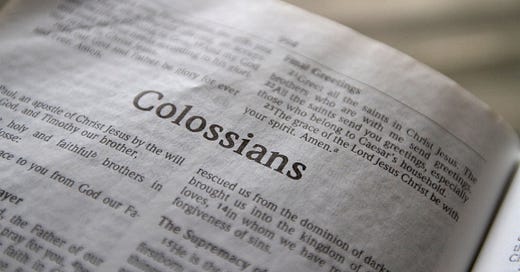If you are looking for the beginning of the study for the Apostle Paul’s letter to the Colossians then you can go HERE for a brief introduction. At the bottom of the introduction you will find the links to each section of the study guide as it becomes available. If you would like to see the growing list of book studies available for free on this site you can go HERE. Enjoy!
Virtues/Vices/Great Ideas: (Find them in the Text)
Faith, Hope, Love, Truth, Wisdom, Light vs. Darkness, Redemption, Forgiveness
Grammar Questions: (The Information of the Text)
According to Paul, what is “bearing fruit and increasing” throughout the “whole world?”
According to Paul, from whom did the Colossians first learn about the gospel of Jesus Chirst?
What are some of the key things Paul prays for on behalf of the saint in Colossae?
What did Paul say the Father had “qualified” the saints in Colossae for?
According to Paul, by whom and for whom were all things created?
What did Paul say was “pleased to dwell” in the person of Jesus (the Son)?
What was the status or position of the Christians at Colossae before Christ had “reconciled” them?
What “stewardship” was Paul given by God?
With whose “energy” did Paul say he worked?
Logic Questions: (Interpreting, Comparing/Contrasting, Reasoning)
Why is it important that Paul makes clear his apostleship is “by the will of God?”
It seems that Epaphras may have been the founding missionary at Colossae, so why might Paul be writing to the saints there now instead of him?
What does it mean to “walk in a manner worthy of the Lord?”
What does it mean to say that the Father has “qualified” someone? What are the qualifications Paul has in mind and how did those qualifications come to belong to the saint in Colossae?
What does it mean for Jesus to be called “the firstborn of all creation?” How might some people misunderstand what Paul means by this?
How did the cross of Christ accomplish the reconciling of God to “all things?” What does this mean?
What does Paul mean by saying “in my flesh I am filling up what is lacking in Christ’s afflictions for the sake of his body?” How could Christ have any lack? How could Paul fill up what is lacking?
What “mystery” is Paul speaking of? Why has it been a mystery in the past?
Rhetoric Questions: (The Analysis of Ideas in the Text)
Faith, hope, and love are sometimes referred to as the “theological virtues.” Look at verses 4-5 of chapter 1 and spot these three virtues there. How important are these virtues in the life of a Christian? Is one more important than another? Is there a natural order to them (in rank or time)? Can a believer have one or more of these but not all three or do they necessarily go hand in hand? How does Paul’s use of these virtues in these verses help us to understand the ways in which they are connected?
The deity of Jesus Christ is clearly taught here and elsewhere throughout the New Testament. Why do you think that many cult groups (like the Jehovah’s Witness, and Latter Day Saints) try to deemphasize the true deity of Jesus Christ? Is it possible to be a Christian and not believe that Jesus is truly God? Explain what you think and why.
Theological Analysis: (Sola Scriptura)
Compare Paul’s greeting to the people of Colossae to that of his other New Testament letters (Romans-Philemon and maybe Hebrews). What elements of his greeting are fairly common among his letters? Why might he generally keep his greetings so similar?
An “image” is a picture or visible representation of some thing or person. In Scripture, however, the word “image” is often used to denote an idol. The Scriptures, particularly the second commandment of the ten commandments, (c.f. Ex. 20:4-6) forbids the making of images to represent the invisible and immaterial God (Yahweh). Why does God forbid us to make images to represent him? In light of the prohibition against images, why is it okay that Jesus is said to be “the image of the invisible God?”
According to Genesis 1, who created all things? According to Colossians 1, who created all things? How then should we reconcile the difference between the two claims? See also John 1 and Hebrews 1 for further reflection on this point.
Paul said the believers were now “blameless and above reproach before him” if indeed they continued “in the faith.” How can we be blameless since we still sin every day? Consider Psalm 18:31-36 and Job 1:1-5 before giving your answer.
Continuing on the previous question, is Paul saying that some who are truly “in the faith” could still be lost if they don’t remain? Does this mean that those who have been justified by God’s grace through faith can still be lost? Consider Romans 8:29-30, Hebrews 6:1-8, and 1 John 2:19.



